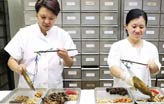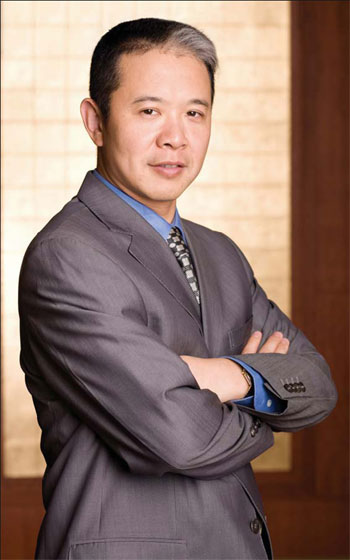Shifting value to top of the chain
Updated: 2011-09-02 09:02
By Matthew Morgan (China Daily)
|
Edward Zhu, CEO of CHIC Group, says China's rapid population expansion creates opportunities for other countries. Provided to China Daily |
CEO's vision blazes path for CHIC Group across sectors
Shrewd but charismatic, sharply dressed Edward Zhu is focused on value to the point of obsession. When asked what motivates him, he doesn't hesitate to say "value creation for our strategic partners that include our customers, investors and employees".
His obsession with value has carried over to his lectures at his alma mater, China Europe International Business School (CEIBS) in Shanghai.
The topic of his lectures? Economic Value Added (a performance metric that measures profits after capital costs).
After working in the freight and logistics business in the United States for a few years, he returned to China in 1996 and became managing director of shoemaker Dr. Marten's Chinese subsidiary.
After achieving success in shifting the company's supply chain from the United Kingdom to China and introducing the brand to the Chinese market, he founded the CHIC Group, a for-profit company that helps develop businesses in China.
Established 14 years ago, the CHIC Group has staff members of 12,000 in 19 companies and seven factories worldwide. The company, which started out as a small freight forwarding and logistics company, has since evolved into a diversified conglomerate with subsidiaries in a range of sectors such as food, agriculture, home and garden products as well as medical equipment. Its clients include Del Monte, Heinz, Spectrum Brands, Coca-Cola and Yum! Brands.

The success of the company, Zhu says, is its insistence on instilling and selling value in clients. He says the most important aspects of the company's plan are manifold: research and development; innovation and design investments in agriculture for sustainability and food safety; maintaining the level of food quality at both the corporate and ground levels; and managing the supply chain.
Managing the supply chain is something the company prides itself on and invests heavily in. It licenses its technology to other companies. Del Monte, for instance, is a key partner. CHIC's supply chain management is so sophisticated, according to Zhu, they can tell precisely which tree a given orange came from.
He also has a keen vision for the future in terms of both the challenges and opportunities that current trends suggest are coming.
"Nobody predicted that globalization would last such a long time, for over 30 years in China, and that it would still remain at this time. Going forward the pattern will change. China will still import but China will also start to import tremendous quantities, from commodities to finished products, services and technologies from Europe and the rest of the world."
One of the key trends shaping China's future, Zhu says, is its population growth.
"China's urban population is expanding by about half a billion in 2005 to almost a billion by 2030. More than 350 million people will be added to the population in 2025 - this is a greater number than the total population of the US."
He is clear about what the implications of these changes have for Europe.
"The mega size of the Chinese population and growing urbanization continue to create great opportunities for imports. We are building up all these cities with (China's rapid) expansion. When we build cities, we need cement, we need infrastructure, we need technologies, we need all kinds of goods and services from Europe."
This rapid and vast rise in population has clear implications for a sector dear to his heart - agriculture. There are a number of major challenges for Chinese agriculture.
The country has about one quarter of the global average in terms of water supply and its urbanization and development efforts have taken away 6.5 percent of its arable land.
China is endowed with only 40 percent of the global average amount of arable land per capita, just 0.08 hectares per capita, compared with 0.32 in Brazil, 0.6 in the US. Even the world's second most populous country, India, comes in 75 percent higher with 0.14.
"The gap is huge," he says. "The only way to change this is to bring in technology (in order) to change the total factor productivity toward growing the economy. China's constant growth strategy in terms of GDP has been more focused on labor inputs and investment and China needs to shift its attention to the total factor productivity which means to me (a shift in focus to) technology and innovation and which also means to me talent."
He stresses the need for agricultural reform and moving away from the traditional small scale farming that is so common in the Chinese countryside.
But he worries that when it comes to "moving into large scale farming, I just don't see that we are prepared. The nation is calling for large scale farming but the talent is just not there."
Food security is clearly a major issue for China that presents three main opportunities for Europe: agricultural and food exports to China, investment opportunities in China, and agricultural educational services.
"China is hungry for technology and education," Zhu says.
He says education will play a crucial role in solving the problem.
As to what the future holds for CHIC, his ambitions are clear: While CHIC is an international company, his aim is to move "from being an international company to a global company. ... International means shipping from China to the world. Global means hiring people in a different country, producing in a different country, conducting R&D in a different country, selling in that country and from that country to the world".
E-paper

City's dynamic teutons
German cluster gives a fillip, competitive edge to local economy in Taicang
Short and sweet
Game for growth
Character reference
Specials

Hunting grounds
Opinion divided as China debates opening door to international players

Flying the TCM flag
A small German town is home to Europe's flagship clinic for traditional Chinese medicine

Animal attraction
World's youngest chief fur designer set to launch own label and tap into huge China market.

